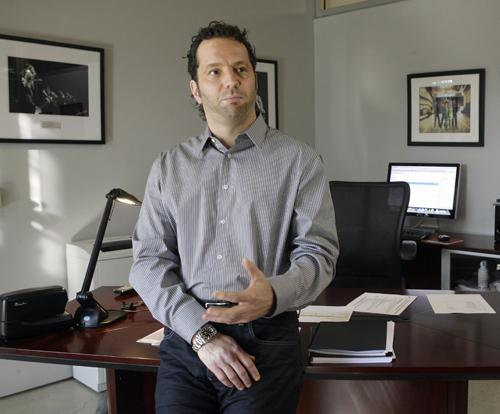Live Nation, Ticketmaster begin defending merger

Live Nation CEO Michael Rapino is interviewed at his office in Beverly Hills, Calif., Thursday, Jan. 15, 2009. Nick Ut, The Associated Press
February 11, 2009
LOS ANGELES – Concert promoter Live Nation Inc. and ticketing giant Ticketmaster Entertainment Inc. confirmed their merger plans Tuesday and got right to work addressing antitrust concerns that have taken center stage.
Ticketmaster Chairman Barry Diller, to be chairman of the new company – which would be called Live Nation Entertainment – sought to dispel the notion that the deal would lead to higher ticket prices.
“Ticketmaster does not set prices. Live Nation does not set ticket prices. Artists set the prices,” he said, without mentioning the ticket surcharges Ticketmaster relies on for much of its revenue.
Under the deal announced Tuesday, each Ticketmaster share would be replaced by 1.384 shares of Live Nation stock. Ticketmaster shareholders would own 50.01 percent of the new company, while Live Nation shareholders would have 49.99 percent. Live Nation Chief Executive Michael Rapino would be the new company’s CEO.
The companies estimated the value of the combined business at $2.5 billion and said the deal would help them save about $40 million annually. If it gets approval by antitrust authorities, the companies hope to complete the merger in the second half of the year.
Get The Daily Illini in your inbox!
Live Nation and Ticketmaster argue that together they could better withstand the recession, sell more tickets and improve service to fans by bringing together their expertise in promotions and ticketing. The companies also plan to remind regulators that other competitors are looking to expand in ticketing, including Major League Baseball’s Tickets.com subsidiary.
However, the merger comes just as Ticketmaster is under fire for recently redirecting people buying Bruce Springsteen tickets from its regular Web site to its reselling subsidiary, TicketsNow. That site had more expensive seats above face value, even though face-value tickets were still available. New Jersey’s attorney general launched an investigation, and a class-action lawsuit in Ontario claims Ticketmaster made a similar up-selling move in November for a Smashing Pumpkins concert.
Diller blamed the Springsteen incident on a “technical glitch” by a credit card company, and said the Canadian lawsuit was “without merit.”
“They are just chasing cars down the road,” he said.
Ticketmaster had already apologized for the Springsteen episode and said Tuesday it had taken steps to prevent a repeat. But the fallout remains. Springsteen recently posted a statement on his Web site saying the Ticketmaster-Live Nation merger could end up “returning us to a near-monopoly situation in music ticketing.”
And Sen. Charles Schumer, D-N.Y., released a statement Tuesday opposing the merger, calling the Springsteen ticketing debacle a “bait-and-switch” scam.
“It is very hard to trust Ticketmaster,” said the senator, a member of the Judiciary Committee. “This merger would give a giant, new entity unrivaled power over concertgoers and the prices they pay to see their favorite artists and bands.”
Diller said Schumer’s comments were “factually untrue.”
Analysts believe the merger could lower some ticket prices because the two companies could present a united front to artists when negotiating business deals surrounding tours. The companies are also seeking to fill more seats in venues that are going empty.
Ticketmaster sells tickets for more than 80 percent of the major arenas and stadiums in the U.S., according to concert tracking firm Pollstar. Until recently it also sold tickets for Live Nation, which is the world’s No. 1 concert promoter and owns more than 140 venues. Live Nation has comprehensive rights deals covering the tours of such artists as Madonna, Jay-Z, U2 and Shakira.
In January, Live Nation launched its own ticketing service. That brought it and Ticketmaster closer to an all-out scramble for ticketing deals.
Now, Diller said, the tough economy has increased the urgency to merge the companies.
“I have been trying and mostly consistently failing to put these companies together for many years now,” he said. “Now is the time to do this.”
After the Grammy Awards ended Sunday, Neil Portnow, president of the National Academy of Recording Arts and Sciences, took a balanced view of the deal.
“I think it’s not a black and white issue,” he said. “Music’s had a tough time obviously. So to the extent that there can be some efficiencies and you can run a better business, that’s something that we have to look at as something pragmatic. On the other hand, the question becomes, ‘Does this create too much authority and power and control under one roof?'”
Irving Azoff, Ticketmaster’s CEO, who would be executive chairman of the new company, told analysts on a conference call that other artist promoters would be given a fair shake.
“The goal of this company is going to be to get more artists to work and fill more venues and fill more seats,” said Azoff, the longtime manager of the Eagles.
Live Nation and Ticketmaster also hope to concentrate more efforts on the secondary ticketing market, which got Ticketmaster into trouble, but for which premiums for the best seats can reach thousands of dollars. Rapino said the merger “would help restore to artists some of the secondary ticketing revenues currently being lost to other people.”
Jim Holzman, founder of resale site AceTicket.com, took that as a shot across the bow.
“For years, both of those entities said the secondary market was no good. They realized how much it’s growing and they’ve decided to get into it,” Holzman said. “If their goal is to put me out of business … it’s going to be a battle.”
Live Nation shares fell 47 cents, or 8.9 percent, to close at $4.82 on Tuesday, while Ticketmaster shares dipped 42 cents, or 6.4 percent, to $6.15.






